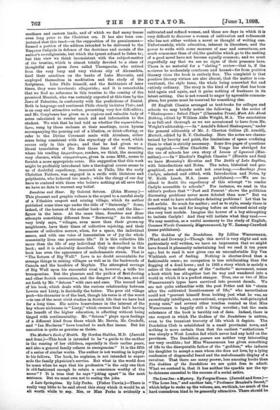Of English Classics arranged as text-books for colleges and schools
we may briefly notice the following. In the series of " Shakespeare : Select Plays " (Clarendon Press), Much Ado About Nothing, edited by William Aldis Wright, M.A. The annotation is as full and thorough as we are accustomed to have from Mr. Wright's editorship.—In " Arnold's School Shakespeare," under the general editorship of Mr. J. Churton Collins (E. Arnold), Macbeth, edited by R. F. Cholmeley. Here the notes are charao- teHsed by brevity and point, the limitations of space confining them to what is strictly necessary. Some five pages of questions are supplied.—Miss Charlotte M. Yonge has abridged for the use of schools her own story of Lances of Lynwood (Mac- millan).—In " Blackie's English Classics " (Blackie and Son) we have Macaulay's Horatius and The Battle of Lake Begillus, with Introductions and Notes. The notes, historical and geo- graphical, are adequate and not over-long.—Readings from Carlyle, selected and edited, with Introduction and Notes, by W. Keith Leask, M.A. (same publishers).—We are in- clined to doubt the expediency of this attempt "to render Carlyle accessible to schools." For instance, we read in the, editor's preface that " 'Past and Present' shows the politician discussing problems never more debated than now." But we do not want to have schoolboys debating problems ! Let that be left awhile. So much for matter ; and as to style, surely there is something to be said for keeping before an unformed mind only the very best models. Imagine the horror of a boy attempting to imitate Carlyle ! And they will imitate what they read.— We may mention, as a useful accessory to the study of English, Common Words Commonly Mispronounced, by W. Ramsay-Crawford (same publishers).






































 Previous page
Previous page